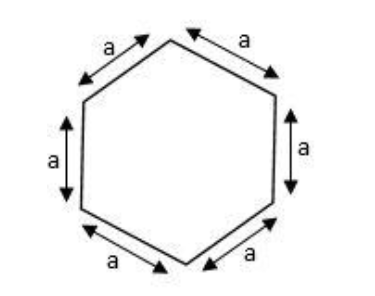Question
Question: A right pyramid is on a regular hexagonal base. Each side of the base is \(10m.\) Its height is\(60m...
A right pyramid is on a regular hexagonal base. Each side of the base is 10m. Its height is60m. The volume of pyramid is
(A) 5196m3
(B) 5200m3
(C) 5210m3
(D) 51220m3
Solution
The regular hexagon is formed by six equilateral triangles. Use this concept to find the base area of the hexagon. And then, use the base area to calculate the volume of the pyramid by using the formula of volume of the pyramid in terms of base area.
Complete Step By Step Solution:
According to question the figure can be drawn as,

It is given in the question that the base of the pyramid is a regular hexagon. That means, all the sides of the hexagonal base will be the same.
Let a= side of pyramid
It is given that each side of the base is 10m. means
a=10m.
It is also given that, the height of the pyramid is 60m
Let h be the height of the pyramid. Then,
h=60m
We have to find the volume of the pyramid.
Now, we have the formula for the volume of the pyramid as,
Volume of a pyramid=31×base area×height . . . (1)
To substitute the values in the above formula, first we have to find the Base area because it is needed in volume formula.
Now, since the base is a regular hexagon, the central angle of the hexagonal will be divided into 6 parts. Thus, the central angle of each section of the hexagon will be =6360=60∘
Since, it is a regular hexagon, we can conclude that, each part will be the equilateral triangle and all the angles will be 60∘
Therefore, the base area of the regular hexagon will be equal to six times the area of one equilateral triangle.
Therefore, Base area=6×43(a)2
We know that a=10m
Therefore, Base area =233(10)2
=233×100m2
Now put the value of Base area in volume formula, in equation (1).
Thus, Volume of the pyramid =31×base area×height.
=31×233×100m2×60m
=33×1000m3
Thus, the Volume of pyramid =5196m3
**Therefore, from the above explanation, the correct answer is, option (A) 5196m3
Note: **
Knowing the properties of regular hexagons was critical in solving this question. You cannot calculate the base area of the hexagon until you come to the conclusion that the hexagon is formed by the six equilateral triangles. Once, you understand this, then the rest of the question was just substituting the values in the formula, which you need to know as well.
